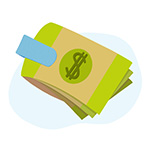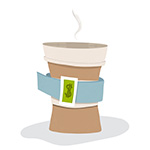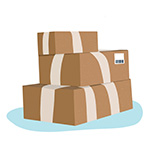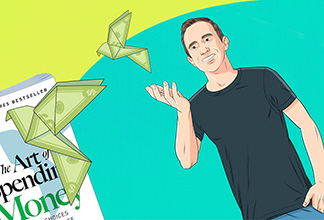Ideas for 2021: 10 Smart Money Hacks During Uncertainty
Written by Mary Levitski
Published on January 13, 2021
minute read
Share:
Ever wonder how the bankers bank? Last year, we delivered money management ideas that our RBC colleagues — analysts, number crunchers, data geniuses — apply to their own finances. From conscious spending to auditing bills to setting sub-goals, they offered easy-to-replicate fiscal responsibility gold. Now they're back with their money lessons from the pandemic.
 1. Consider the Value of Cash
1. Consider the Value of Cash
When the pandemic rattled the markets early last year, our resident math whiz saw it as an opportunity to buy low as well as rebalance his portfolio. However, most of his holdings were locked up in securities, so he didn't have much cash on hand. "I've learned my lesson," he says, explaining that he's since committed a portion of his holdings to cash. "Cash offers flexibility that I had previously overlooked." Investors may be reluctant to keep a lot of cash in their investing accounts, says a chartered investment manager on our client relationship team, because it negates the potential rates of return of placing funds in the markets. "But a bit of 'dry powder' on hand can help you take advantage of opportunities."
FAST FACT: Dry powder is investing slang for cash and highly liquid securities. |
2. Develop Your Volatility Playbook
"I froze," says our digital content producer about her investing earlier last year. None of the strategies she had developed during the sustained 11-year bull market applied. "In retrospect, I missed some opportunities I wish I'd jumped on," she says. Since then, she's devised a volatility playbook of sorts: "I tune in to news and market watchers to try to stay abreast of potential volatility," she says. "I plan what I'll do before it hits in case I freeze again."
The chartered investment manager echoes her sentiments: "It's good to have a roadmap of where you think things are going so that you can position your portfolio to protect against volatility or to take advantage of it." How? As an investor, you might identify sectors that you expect to be vulnerable, he says. "Then you can be prepared to either buy, sell or short to make some money off that."
FAST FACT: People tend to respond to a crisis in one of three ways — fight, flight or freeze. Getting to know your natural knee-jerk reaction might help you build your volatility roadmap. |
 3. New Normal, New Budget
3. New Normal, New Budget
The data is clear: Canadian spending has changed dramatically as a result of the pandemic. Early on, after weeks of saving on things like commuting and dining out, yet splurging on groceries and home improvements, our strategic initiatives manager took a step back and assessed. "It was nice that I was saving in some areas without really trying, but what about the spending?" He sat down and adjusted the family budget, something he says he's done a few times since to make sure his plan still matches his present normal. "Things keep changing, but I'm working to keep up," he says.
4. Double (or Triple) Down on Deals
A penny saved is a penny earned as far as our director of product strategy is concerned. How does she save those cents? That's the fun part, she says. Take homemade meals, for instance, which circumstances have dictated more of. "I use an app to meal plan each week," she says, "which saves me money on groceries, plus I end up eating healthier." She then cross-references with a digital coupon aggregator. "I look for the best flyer offers on costlier grocery items and use price matching for stores that allow it." Of course, she pays with a credit card that offers rewards, and also takes advantage of cash-back apps.
FAST FACT: Many membership programs offer exclusive coupon codes. |
 5. Don't Cheap Out on Cheer
5. Don't Cheap Out on Cheer
Notably, our strategic initiatives manager is happy to splurge if it will up his happiness quotient and that of the people around him. "I'm actively looking at ways I can spend to make the world seem brighter as days are darker and gloomier," he says — like a coat of wall paint, a new picture on the wall. Of course, taking care of yourself and others need not cost a dime. "I cuddle my dog more and tend to her every need these days," says one of our communications experts. "I know I'm looking after myself by extension."
6. Spread the Donation Love
"Seeing how the pandemic impacted my community, I have felt moved to make donations to various organizations," says our production editor, adding that she wishes she could do more. "I had donated a lump sum late in 2019 like I always do around tax time, so I didn't have dedicated funds available." Taking a lesson from a popular investing strategy, dollar-cost averaging, she's decided to shift her charitable giving approach toward smaller, more frequent donations throughout the year to help meet needs as she sees them.
FAST FACT: You can change the names of your accounts. Creating a savings account called Community Fund or Donation Dollars, for example, can help you keep an eye on your charitable goal. |
 7. Rethink Plans
7. Rethink Plans
Our digital content producer has saved a lot of money over the years by carefully reviewing her bills and statements. "You really never know when a hidden fee will crop up, or when you're double-charged in error," she says. In 2020, she looked critically at the fees she did sign up for. "Why am I paying extra insurance on the car that hasn't left the driveway in over a month?" she asked herself, for example. A member of our operations team was on the same wavelength: "Why pay for cell phone data if I spend nearly all my time at home now?" Both called their service providers to adjust their plans. It's a bit of a manual process, they admit, but the savings have added up.
8. Self-Aware Self-Care
Retail therapy is real, says our senior digital product manager and self-professed resident shopaholic. "E-commerce has evolved," she says. "It's now easier than ever to purchase items with a few taps on your phone, and be sucked into those personalized ads that know exactly how to hook you with an unbeatable sale." Here are some tactics she's found helpful: separating needs from wants, assigning a monthly spend max and setting a frequency to purchasing. The key? Strictly sticking to your own rules.
 9. Emergencies Will Surprise You
9. Emergencies Will Surprise You
Like so many of you, our colleagues didn't see the pandemic coming, and yet several were prepared with some emergency savings. "It can be hard to put money aside for an emergency because, in a sense, you're preparing for the unknown," says our vice-president of strategy. But asking yourself what's the worst that can happen isn't productive (nor will it help you sleep at night). "Last year has really shown me that it's as important to be prepared for a sudden need as it is to have a clear vision of what you're preparing for."
10. Don't Give in to the Pressure of Present Bias
As the saying goes, this too shall pass. While our colleagues advocate for adjusting your approach to the current moment, they caution against losing sight of the bigger picture. Keep your long- and even medium-term goals in mind.
*This article was updated on January 27, 2021.
RBC Direct Investing Inc. and Royal Bank of Canada are separate corporate entities which are affiliated. RBC Direct Investing Inc. is a wholly owned subsidiary of Royal Bank of Canada and is a Member of the Canadian Investment Regulatory Organization and the Canadian Investor Protection Fund. Royal Bank of Canada and certain of its issuers are related to RBC Direct Investing Inc. RBC Direct Investing Inc. does not provide investment advice or recommendations regarding the purchase or sale of any securities. Investors are responsible for their own investment decisions. RBC Direct Investing is a business name used by RBC Direct Investing Inc. ® / ™ Trademark(s) of Royal Bank of Canada. RBC and Royal Bank are registered trademarks of Royal Bank of Canada. Used under licence.
© Royal Bank of Canada 2025.
Any information, opinions or views provided in this document, including hyperlinks to the RBC Direct Investing Inc. website or the websites of its affiliates or third parties, are for your general information only, and are not intended to provide legal, investment, financial, accounting, tax or other professional advice. While information presented is believed to be factual and current, its accuracy is not guaranteed and it should not be regarded as a complete analysis of the subjects discussed. All expressions of opinion reflect the judgment of the author(s) as of the date of publication and are subject to change. No endorsement of any third parties or their advice, opinions, information, products or services is expressly given or implied by RBC Direct Investing Inc. or its affiliates. You should consult with your advisor before taking any action based upon the information contained in this document.
Furthermore, the products, services and securities referred to in this publication are only available in Canada and other jurisdictions where they may be legally offered for sale. Information available on the RBC Direct Investing website is intended for access by residents of Canada only, and should not be accessed from any jurisdiction outside Canada.
Explore More

How Inflation-Proof Are Your Investments?
Why inflation still matters – and how to stay ahead of it
minute read

What Investors Should Know About the Precious Metals Market
Factors influencing silver, platinum and palladium
minute read

The Art of Spending: 5 Takeaways from Morgan Housel’s New Book
Ideas for how to build a healthier relationship with money and how you spend it
minute read
Inspired Investor brings you personal stories, timely information and expert insights to empower your investment decisions. Visit About Us to find out more.







